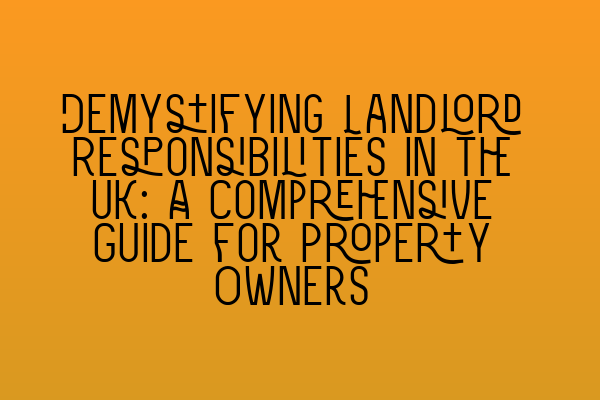Demystifying Landlord Responsibilities in the UK: A Comprehensive Guide for Property Owners
Being a landlord in the United Kingdom comes with a set of responsibilities and obligations that need to be understood and fulfilled. Whether you are a new property owner or have been in the rental business for some time, it is crucial to have a clear understanding of your obligations as a landlord. In this comprehensive guide, we will demystify the landlord responsibilities in the UK, providing you with the essential knowledge to navigate through the legal requirements and ensure you are running your property business lawfully.
1. Providing a Safe and Habitable Environment
As a landlord, it is your responsibility to provide your tenants with a safe and habitable environment. This includes ensuring that the property is free from health hazards, such as mold, dampness, and vermin. Regular inspections and maintenance are essential to identify and rectify any issues promptly. Additionally, you must comply with all health and safety regulations, such as providing working smoke detectors, carbon monoxide alarms, and fire extinguishers.
For further information on health and safety regulations, refer to the SQE 1 Practice Exam Questions article.
2. Repair and Maintenance
Keeping the property in good repair is another crucial responsibility of a landlord. You must address any repairs promptly and ensure that the property is maintained to a reasonable standard. This includes fixing plumbing issues, electrical faults, and structural problems. Regular inspections and proactive maintenance can help prevent small issues from turning into costly repairs in the future.
For more information on handling repairs and maintenance, check out the SQE 1 Practice Mocks FLK1 FLK2 article.
3. Compliance with Legal Requirements
As a landlord, you must comply with various legal requirements to ensure your property business operates within the law. This includes having valid gas and electrical safety certificates, obtaining an Energy Performance Certificate (EPC), and complying with property licensing regulations. It is essential to keep up-to-date with any changes in legislation to avoid potential penalties and legal issues.
For a more detailed understanding of legal requirements and to avoid any pitfalls, consider enrolling in SQE 2 Preparation Courses.
4. Tenancy Agreements and Deposit Protection
When renting out a property, it is important to have a legally binding tenancy agreement in place. This agreement should outline the terms and conditions of the tenancy, including rental amount, payment schedule, and any additional rules or restrictions. Furthermore, you are legally required to protect your tenant’s deposit in a government-approved deposit protection scheme.
For further guidance on creating a robust tenancy agreement and ensuring proper deposit protection, consider exploring SQE 1 Preparation Courses.
5. Dealing with Tenant Complaints and Disputes
As a landlord, you may encounter tenant complaints and disputes. It is crucial to handle these situations professionally and within the boundaries of the law. Communication is key when addressing any concerns raised by your tenants. If a dispute cannot be resolved amicably, you may need to seek legal advice or mediation to reach a mutually agreed-upon solution.
For further assistance in managing tenant complaints and disputes, refer to the SRA SQE Exam Dates article.
Conclusion
Being a responsible landlord requires a comprehensive understanding of your legal obligations. By providing a safe and habitable environment, prioritizing repairs and maintenance, complying with legal requirements, ensuring proper tenancy agreements and deposit protection, and effectively managing tenant complaints and disputes, you can establish a successful and compliant property business.
For further guidance and preparation for the SQE exams, explore our range of articles and courses at SQE Property Law & Land Law.
